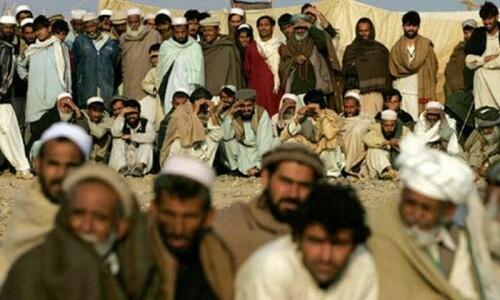ISLAMABAD: The politicisation of data is one of the major dangers that faces researchers and policymakers today, and one of the main reasons why there has not been a census in so long is that every political party will try to fudge the numbers to give themselves the advantage.
On the second day of ‘Pathways to Development’, the 17th sustainable development conference organised by the Sustainable Development Policy Institute (SDPI), policy researcher Asif Memon and Marc Andre Franche, country director for the United Nations Development Programme, highlighted the dangers associated with inadequate data collection and stressed the need for evidence-based discourse in policy-making circles.
Speaking during a session entitled ‘Data Revolution: Bringing Data and Evidence to Bear Upon Pakistan’s Education Policymaking’, Mr Memon said, “Statements made without evidence are worthless. This is what our attitude should be when it comes to policymaking.”
“The data regime is not a priority. There are no well-researched impact assessments of projects such as the Benazir Income Support Programme (BISP). There are reports masquerading as impact assessments, but they suffer from a lack of basic metrics. The proper methods are often too expensive and time-consuming, which is why they are not employed,” he said.
The data that is available is flawed. “In most cases, the data collection and reporting is not timely. For example, PSLM data is always two years behind the current year,” he said. In addition, he highlighted issues with the baseline used by these surveys.
The Pakistan Social And Living Standards Measurement (PSLM) data, he said, was based on the 1998 census and did not reflect the Pakistan of 2014.
“Pakistan will fail to report that it has accomplished the goal of universal primary education in the country,” Mr Memon told the audience. “No one knows what is the rupee amount spent on education in Pakistan,” he said, adding that it was simple enough to find the dollar amount, but the rupee amount was a matter of some contention.
“How much does Pakistan spend on a school-going child,” he posited. The calculation, he said, took them dozens of man-hours to calculate. In the process, he said, his team discovered that the federal government only has data on schools in Islamabad and Fata and it does not count children studying in federal government-run schools in the provinces.
He said the provinces told them that they did not count such students among provincial totals either and that there was difference between federal government-run schools in the provinces and schools which followed the federal government syllabus.
There was also no data on army cadet colleges, which were paid for by the defence ministry. Asking too many questions of them, he said light-heartedly, would prompt people to ask him why he was asking such questions in the first place.
One of the researches, presented by independent consultant Safyan Jabbar, also highlighted how, when schools were given funds by donors, they spent the bulk of them on activities such as whitewashing the premises, repair and maintenance of infrastructure and new installations, with very little left over for expenditures such as stationery, teachers’ salaries and utility bills.
UNDP’s Mr Franche observed that a lot of the people who could help with the problems that were being discussed at the panel, such as donors and government officials, were not even part of the current conversation.
Deploring the lack of a fresh census, he told the audience that Pakistan had the dubious distinction of being the third country – alongside war-torn Chad and Afghanistan – that had not carried out a census in over 20 years. He also regretted that most quality data is very project specific and is not collected at the institutional level.
To illustrate just how problematic data collection was, even in the present day, he said that the UNDP had only been able to track 18 of the 41 indicators for success at the Millennium Development Goals.
“Some data is better than no data at all,” said Scherezad Latif, a consultant with the World Bank. But in the same breath, she also stressed that in addition to being available, data also needed to be valid and reliable so policymakers could make accurate decisions.
The second day of the conference also saw lively discussion around the ‘Role of Afghanistan in Regional Stability’, former ambassadors Akram Zaki and Munawar Saeed Bhatti, as well as World Bank energy consultant Haroon Sharif, academic Dr Moeed Yusuf as well as the Afghan ambassador Janan Mosazai and Kabul CAA Director, Dr Qasim Wafayezada.
Published in Dawn December 11th , 2014
















































